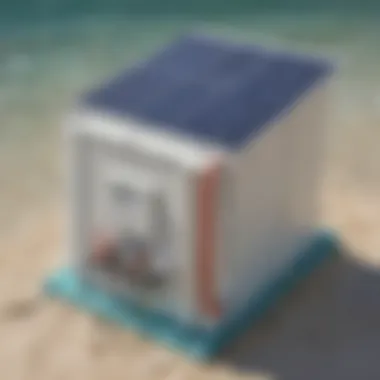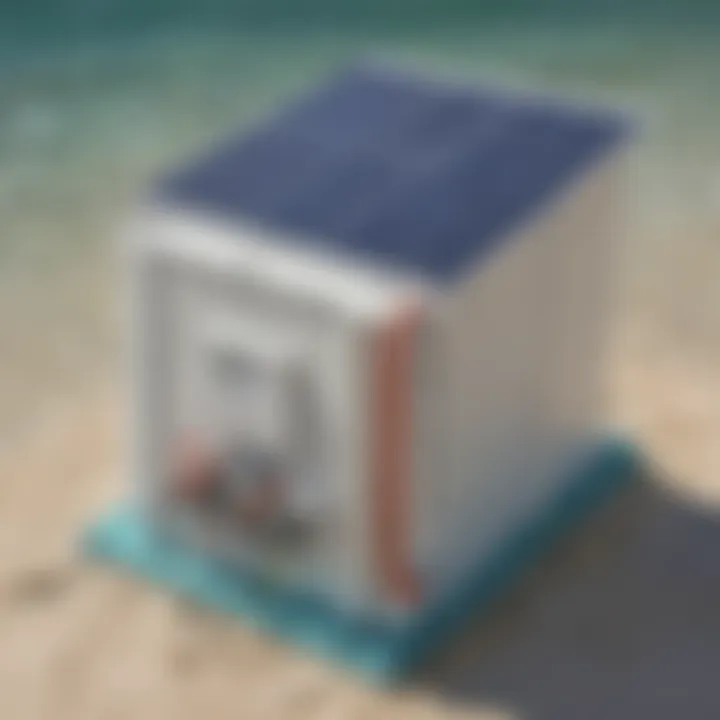Exploring Saltwater Solar Batteries for Renewable Energy


Intro
As we stride deeper into the era of renewable energy, there's a growing need for innovative ways to store that energy. Among these, saltwater solar batteries are emerging as a fascinating alternative. Unlike traditional batteries that can be highly toxic, saltwater batteries harness the power of natural materials, making them eco-friendly and safe. This article explores the intricacies of saltwater solar batteries for everyone from curious children to parents keen on understanding emerging technologies. Get ready to dive into the realm of chemistry and renewable energy!
Science Fun Facts
Interesting Trivia and Facts
- Nature's Simplicity: Saltwater batteries use sodium ions, which are abundant and inexpensive compared to lithium ions found in common batteries.
- Longer Lifespan: One of the standout features of saltwater batteries is their longevity. They can often last longer than traditional batteries, which typically degrade over time due to continuous charge cycles.
- Environmental Heroes: Unlike lead-acid batteries, which can leak harmful substances, saltwater batteries don't pose a significant environmental risk in case of leakage. They’re much safer for our ecosystems.
Quirky Science Stories
Imagine a scientist who stumbled upon saltwater battery technology while attempting to create the ultimate sports drink! By mixing ingredients, they realized that combining saltwater with the right components could yield a powerful energy source. This happy accident is a reminder that sometimes, the best discoveries happen when we least expect them.
Amazing Science Records
Did you know that the largest saltwater battery system is located in Hamburg, Germany? This impressive setup can store enough energy to power numerous homes, showcasing the incredible potential of this technology!
Thought-Provoking Questions
- Why do you think saltwater batteries could be more beneficial than lithium-ion batteries?
- How might using natural materials change the way we think about energy storage in the future?
Discover the Wonders of Science
Exploring Various Scientific Concepts
Saltwater batteries work by using sodium chloride (table salt) as the electrolyte. This mixture allows sodium ions to move between the electrodes, creating an electric current. It's a bit like a race where sodium ions dash back and forth to generate power. Understanding this process can spark your imagination about how everyday items can create energy!
Educational Videos and Animations
For a visual representation of how saltwater batteries work, check out this YouTube video that delves into the science behind this technology. Watching the processes in action can help solidify the concepts we've discussed.
Interactive Learning Tools
- Khan Academy offers a comprehensive introduction to the basics of batteries and energy storage. It’s a wonderful resource to further your understanding. Visit them at Khan Academy.
- You can also join some online platforms, like Reddit, where science enthusiasts share their discoveries and experiments related to energy technologies.
Real-Life Applications of Science
One of the most exciting aspects of saltwater batteries is that they can be used in various practical applications. For example, they can power homes during power outages or store energy from solar panels to be used at night. This technology presents a promising solution to our energy challenges, benefiting not just individuals, but entire communities.
Science Quiz Time
Interactive Quizzes
There are fun quizzes available online that can test your knowledge about batteries and energy storage! Sites like Britannica provide quick quizzes that make learning engaging.
Multiple Choice Questions
Here’s a quick question to ponder:
- What material is commonly used in saltwater batteries?
- A) Lithium
- B) Sodium
- C) Lead
(Answer: B - Sodium)
Brain Teasers and Puzzles
Think of a puzzle that revolves around how you could use saltwater batteries in your daily life. Maybe creating a sunny-day energy source for your home? Challenge your family to come up with innovative solutions!
Learning Through Gamification
Websites that gamify science learning allow students to engage with energy concepts better. By participating in interactive games, kids can learn about electricity, circuits, and battery technology in a fun way.
Science Experiment Showcase
Fun and Engaging Experiments
Why not try a simple experiment to see how saltwater can conduct electricity? You can use a battery, a small light bulb, and a cup of saltwater. Connect wires from the battery to the light bulb and submerge the other ends in saltwater. Watch the light bulb light up!
Step-by-Step Instructions
- Fill a cup with water.
- Add a tablespoon of salt and stir until it dissolves.
- Attach a battery to a small light bulb using wires.
- Submerge the other ends of the wires into the saltwater.
- Observe.
Materials List
- Cup of water
- Table salt
- Battery
- Wires
- Small light bulb
Safety Tips and Precautions
- Always handle batteries with care. Don’t touch the terminals with wet hands.
- Dispose of used batteries properly.


This exploration of saltwater solar batteries not only sheds light on a promising alternative energy storage solution, but it also helps instill a deeper understanding of science in young minds. Through engaging facts, real-world applications, and hands-on experiments, we can encourage future generations to innovate and solve the energy challenges we face.
Preamble to Saltwater Solar Batteries
Saltwater solar batteries are emerging as a crucial component in the renewable energy landscape. With the ongoing global push towards sustainable energy solutions, understanding these batteries is more important than ever. These batteries offer a safe, eco-friendly alternative to conventional energy storage technologies, which often rely on hazardous materials. Saltwater solar batteries are designed to store energy generated from solar panels and are particularly appealing for their less harmful ingredients and lower environmental impact.
What makes saltwater solar batteries stand out is not just their composition but their potential to contribute meaningfully to energy conservation efforts. By delving into this topic, we explore how these innovative solutions can help homes and communities achieve greater energy independence, thereby reducing reliance on fossil fuels.
What Is a Saltwater Solar Battery?
In its essence, a saltwater solar battery uses a mixture of saltwater, or an electrolyte solution, to store electrical energy. Unlike conventional batteries that depend on toxic metals and materials, these batteries are composed mainly of safe components, making them more sustainable and environmentally friendly. When the battery is charged, electrical energy transforms into chemical energy through a series of reactions involving dissolved salts.
When discharging, this chemical energy reverts back to electrical energy, providing power to homes, schools, or other structures as needed. This process is relatively straightforward, but incredibly efficient, which makes saltwater batteries an attractive option for energy storage.
The Importance of Renewable Energy
Renewable energy continues to take center stage in the conversation around combating climate change. Harnessing the power of natural resources like sunshine is a step towards a sustainable future. With innovations like saltwater solar batteries, we not only gain reliable energy storage solutions but also address the adverse effects commonly associated with traditional battery technologies.
The significance of renewable energy extends beyond preventing environmental harm; it also encompasses energy security and economic benefits. By investing in technologies that harness solar energy effectively, we not only make our homes more energy-efficient but also can create jobs in the renewable sector. This illustrates how a clear understanding of saltwater solar batteries fits within the broader context of renewable energy advancements, making it essential for young enthusiasts and families alike to grasp the impact of their energy choices.
Understanding Battery Technology Basics
Grasping the fundamentals of battery technology is essential when talking about innovative solutions in energy storage like saltwater solar batteries. Batteries play a crucial role in our daily lives, powering everything from your smartphone to electric cars. Understanding how they function helps emphasize the potential benefits of new technologies, especially those that are friendly to the environment.
How Batteries Store Energy
At the heart of any battery is a simple principle: they store energy as chemical energy and convert it into electrical energy when needed. When you charge a battery, an electric current flows through it, prompting a chemical reaction that stores energy. Think of it like filling up a glass of water from a tap; as long as the tap is on, it collects and holds the water.
When the battery is used, it releases this stored energy through another chemical reaction, similar to pouring the water out of the glass. The efficiency of this energy storage and release process defines the battery's effectiveness in practical applications.
Types of Batteries in Use Today
There are various types of batteries out there, and each has its own unique way of storing energy. By understanding the leading technologies, we can appreciate what makes saltwater batteries stand out.
Lithium-ion Batteries
Lithium-ion batteries are perhaps the most well-known type of rechargeable battery today. They dominate the mobile device market due to their high energy density. This means they can store a lot of energy in a relatively small space, allowing for compact designs in laptops and smartphones. One key characteristic of lithium-ion batteries is their ability to recharge quickly. This makes them a popular choice for electric vehicles as well.
However, they do come with drawbacks. For instance, they can be expensive to manufacture and have safety concerns like overheating under certain conditions. This is where saltwater batteries begin to show their advantages.
Lead-acid Batteries
Lead-acid batteries have been around for a long time. They're commonly found in vehicles and for backup power needs. One of the standout features of lead-acid batteries is their low cost. They are often cheaper than lithium-ion batteries, making them a good option for budget-conscious applications. However, lead-acid batteries are much heavier and bulkier, and they don’t last as long as newer technologies. Plus, they can release harmful substances if not disposed of properly.
Saltwater Batteries
Saltwater batteries are the new kids on the block. They use a solution of saltwater instead of toxic chemicals. This makes them safer and more environmentally friendly. The key characteristic of saltwater batteries is their ability to provide a stable energy supply without the risks associated with lithium-ion and lead-acid counterparts.
A unique feature is their longevity; they can potentially last longer without degradation compared to traditional batteries. While they still face limitations in energy density and charging speeds, their safety and sustainability make them an exciting option for future energy storage solutions.
"As we aim for cleaner energy solutions, it's crucial to rethink our approach to battery technology. Saltwater batteries could be a game changer in this quest for sustainability."
Understanding these differences in battery technologies not only showcases the innovation behind saltwater batteries but also sets the stage for their applications in renewable energy solutions. The future holds a lot of promise, and as we explore further advancements in battery technology, the potential for saltwater solar batteries seems endless.
The Composition of Saltwater Solar Batteries
Understanding the composition of saltwater solar batteries is crucial for anyone delving into this innovative energy storage solution. These batteries offer unique advantages over their traditional counterparts, primarily due to the materials used in their construction. The special blend of chemicals and the unique role of saltwater not only improve safety but also play a significant part in fostering sustainability in energy storage.
Chemical Components and Reactions
Saltwater solar batteries primarily consist of water, sodium chloride (common table salt), and various sustainable compounds. The main reaction that occurs within these batteries is between sodium ions and the other materials. This interaction enables the storage and release of electrical energy.
In simple terms, when the battery charges, sodium ions move from one electrode to another through the water, much like cars driving down a highway. As it discharges, those ions travel back, releasing energy that can be used to power devices or even homes.
It’s also important to mention that the reactions involved are much safer than those found in lithium-ion batteries, which can be volatile. Saltwater batteries are much less likely to catch fire or explode, making them a safer alternative for energy storage. As a parent or caregiver, knowing that these batteries have a lower risk profile is reassuring.
"The chemical reactions in saltwater batteries not only promote energy storage but also provide a safe alternative for renewable energy solutions."
The Role of Saltwater in Energy Storage
Saltwater plays a starring role in the functionality of these batteries. It acts as both a solvent and an electrolyte—just think of it as the traffic jam of sodium ions that facilitates energy flow. When you charge the battery, the saltwater enables the transfer of energy efficiently, while ensuring that the process is environmentally friendly.
Unlike traditional batteries that often rely on heavy metals, saltwater systems use abundant, sustainable materials. This means we can source them without hefty environmental impacts. Moreover, saltwater is readily available and inexpensive, making the production of these batteries more cost-effective and accessible.
In essence, the integration of saltwater not only enhances the efficiency of energy storage but also aligns perfectly with the goals of sustainability. This makes saltwater solar batteries an ideal choice for families looking to invest in greener energy solutions for their homes.
By understanding the composition of these batteries, it’s clear that they are not just another tech fad; they represent a forward-thinking approach to renewable energy storage that prioritizes safety, sustainability, and efficiency.
Advantages of Saltwater Solar Batteries
Saltwater solar batteries stand out in the realm of energy storage for several reasons that make them appealing not only to engineers and researchers but also to families and young science enthusiasts. Understanding these advantages sheds light on why saltwater batteries could become a critical component in the future of renewable energy technology.


Safety and Environmental Benefits
One of the foremost advantages of saltwater solar batteries lies in their safety profile. Unlike lithium-ion batteries or lead-acid batteries that can catch fire or leak harmful chemicals, saltwater batteries operate using non-toxic materials. The saltwater composition reduces the risk of fire hazards and makes these batteries environmentally friendly. A child could spill a saltwater battery on the floor, and the mess wouldn’t cause any harm, simply because of its benign components.
For example, many parents worry about battery disposal, often concerned about the hazardous waste produced by traditional batteries. Saltwater solar batteries can be more easily recycled, leading to less pollution and lower environmental impact.
"Embracing saltwater battery technology means we're taking a step toward a cleaner, greener, and safer world."
This is particularly appealing to communities aiming to foster sustainable practices. With increasing attention on climate change and environmental issues, parents can see this technology as a responsible choice for their families, teaching the next generation the importance of eco-consciousness.
Cost-Effectiveness Compared to Other Technologies
When considering energy storage options, cost-effectiveness is always a big talking point. Saltwater solar batteries are emerging as a more budget-friendly alternative to their lithium-ion counterparts. While initial costs for saltwater batteries may not be as low as conventional lead-acid batteries, their longevity makes them a wise investment over time. They can typically withstand more charge cycles before needing a replacement.
Some key factors contributing to their cost-effectiveness include:
- Longer Lifespan: Saltwater batteries can outperform traditional batteries in terms of durability, which means fewer replacements and maintenance costs over the years.
- Lower Materials Cost: Salt and water are abundantly available and inexpensive materials, contributing to lower production costs for these batteries compared to the rare materials used in lithium-ion batteries.
- Reduced Service Costs: Due to their safety and ease of handling, service requirements for saltwater batteries tend to be less frequent, leading to further savings.
In essence, the total cost of ownership for saltwater solar batteries may turn out to be much lower when accounting for their longer life and less need for hazardous handling or special recycling methods.
Through this comparison, parents exploring energy solutions for home use can consider saltwater batteries not just for their safety but as an economically sound approach to embracing renewable energy. As the world moves towards greener solutions, these batteries may emerge as the safest and most cost-efficient player in the energy storage arena.
Applications of Saltwater Solar Batteries
The significance of saltwater solar batteries in the realm of energy storage cannot be overstated. As the world shifts its focus toward renewable energy sources, understanding how these innovative batteries integrate into everyday life highlights their value. These applications range from residential settings to large-scale utility solutions, reflecting the flexible nature of saltwater batteries. This ensures the maximum benefit from sustainable energy storage—addressing both individual demand and broader energy needs.
Residential Use of Saltwater Batteries
When it comes to household energy use, saltwater solar batteries present a fantastic option for families striving for energy independence. These batteries function to store energy produced from solar panels, making it available when the sun isn't shining. One of the standout features of saltwater batteries is their safety profile. Unlike conventional lithium-ion batteries, they're less likely to catch fire or explode; which eases worries for many homeowners.
Imagine a scenario where a family installs solar panels on their roof. During sunny days, the panels collect energy and feed it into the saltwater battery. In the evenings, when energy demand peaks, families can draw energy from this stored power.
"Using saltwater batteries allows families to reduce their electricity bills and decrease reliance on the grid."
Key Benefits of Residential Use:
- Cost-Effective Energy Management: Households can save significantly on energy costs.
- Eco-Friendly Option: Saltwater batteries leverage non-toxic materials, benefitting the environment.
- Robust Performance: They typically have a longer operational life than traditional batteries.
Homeowners also enjoy the flexibility to scale their saltwater battery system based on their energy consumption needs. Whether it’s for a small apartment or a larger house, this adaptability promises a tailored solution for each unique situation.
Utility-Scale Energy Solutions
Saltwater solar batteries are not just for individual homes; they serve important roles in utility-scale energy systems too. Larger energy providers are beginning to see the potential in these technologies. They can contribute to grid stability by balancing load and providing energy during peak demand.
Think about a utility using saltwater batteries to store energy for thousands of households. During the mid-day sun’s peak, excess energy generated can be stored efficiently. Later, during busy evenings when everyone turns on lights and appliances, that stored energy can be released back to the grid, making sure the power supply doesn't falter.
Advantages of Utility-Scale Applications:
- Improved Grid Reliability: By smoothening out the fluctuations in energy demand.
- Lower Infrastructure Costs: Saltwater batteries often demand less complex management systems.
- Enhanced Energy Storage Capacity: With substantial energy needs, saltwater technology scales well compared to some alternatives.
As cities grow and the demand for clean energy surges, integrating saltwater batteries into utility frameworks may become commonplace. This not only tackles the challenges of energy supply but also fosters a transition toward greener energy solutions.
In summary, the applications of saltwater solar batteries in both residential and utility-scale environments underline their versatility and effectiveness. With safety, cost-effectiveness, and eco-friendliness as significant factors, it’s clear they are paving pathways to a more sustainable energy future.
Challenges and Limitations
When we talk about saltwater solar batteries, it’s not all sunshine and rainbows. Just like any other technology, these batteries face their own set of challenges and limitations, which can be pretty important to understand, especially for those who want to explore renewable energy solutions. By getting a good grip on these issues, children, parents, and caregivers can appreciate the reality of what it means to dive into this field. So, let’s break it down.
Current Technical Limitations
Even though saltwater solar batteries have some advantages, they also come with technical limitations that can hinder their performance in various contexts. Here are a few key points:
- Energy Density: One of the main hurdles is that the energy density of saltwater batteries isn't as high as that of lithium-ion batteries. What does this mean? Simply put, you have to use more batteries for the same amount of energy, which isn’t ideal.
- Charge and Discharge Rates: Saltwater batteries often have slower charge and discharge rates. This can affect how quickly energy is stored or released, making them less practical for certain applications where quick energy bursts are necessary, like powering an electric vehicle.
- Durability: While saltwater batteries are generally safer than traditional methods, they may face issues with durability over time, especially when it comes to the materials used. Even with ongoing research, we need stronger materials to ensure these batteries can withstand various environmental factors.
In summary, while saltwater batteries show promise in terms of safety and environmental friendliness, we need to address their limitations to make sure they can compete effectively in the energy market.
Market Adoption Barriers
Switching gears to market adoption, it becomes clear that even the best technologies can struggle to get people on board. Here’s a rundown of why saltwater solar batteries may not be flying off the shelves just yet:
- Awareness: Many folks just aren’t familiar with saltwater batteries or how they differ from traditional batteries. Educating the public is key.
- Cost Factors: Even if saltwater batteries are developed as environmentally friendly options, their initial costs could still be high compared to existing technologies. This can deter manufacturers and consumers from making the switch.
- Infrastructure Needs: Current energy systems may not be well-equipped to integrate saltwater technology smoothly. A significant investment in new infrastructure may be needed, and that's a tough sell for companies looking to save or stick with what they know.
- Regulatory Hurdles: Finally, government policies often favor established technologies like lithium-ion batteries. Unless there’s a concerted effort to promote saltwater batteries actively, they might struggle to find a foothold in the market.
"Innovation often meets barriers on the road to success. Understanding these hurdles helps in crafting solutions that can turn challenges into opportunities."
In summary, while the potential for saltwater solar batteries is tremendous, overcoming these market adoption barriers is crucial. Awareness, cost, necessary infrastructure, and regulatory pathways must be addressed for these batteries to become a true competitor in the energy landscape.
Innovations in Saltwater Battery Technology
Saltwater solar batteries represent a pivotal shift in how we think about energy storage. As the world grapples with rising energy demands and climate change, innovative solutions are becoming increasingly critical. Saltwater batteries stand out due to their unique composition and safety features. Integrating them into existing renewable energy frameworks could not only enhance efficiency but also contribute to sustainability. In this section, we will explore notable advancements and future prospects, which could set the stage for broader acceptance and integration across various platforms.
Recent Research Developments


In the past few years, researchers have made significant strides in improving the functionality of saltwater batteries. Here are some key developments:
- Improved Conductivity: Recent studies have focused on enhancing the ionic conductivity of saltwater solutions. This improvement plays a crucial role in increasing the battery's efficiency, allowing for quicker recharges and prolonged usage periods.
- Material Innovations: Researchers have explored the use of various alternative materials that can interact with saltwater in novel ways. For instance, integrating carbon-based materials has shown promise in enhancing performance.
- Environmental Impact Studies: Scientists have conducted extensive research on the environmental advantages of saltwater batteries. By comparing them to traditional lithium-ion batteries, they’ve illustrated a marked reduction in hazardous waste and resource depletion.
All these advancements underline a compelling narrative: saltwater batteries are not merely a theoretical concept; they're rapidly evolving into a viable alternative, poised to play a significant role in renewable energy systems.
Future Directions for Improvement
Looking ahead, the landscape of saltwater battery technology seems bright. Researchers and developers are concentrating their efforts on various promising areas:
- Scalability: Addressing how saltwater batteries can be produced on a large scale is pivotal. Manufacturing techniques that allow for rapid production while keeping costs down will be crucial for market adoption.
- Efficiency Optimization: Ongoing work aims to fine-tune the energy conversion processes within the batteries. Optimizing these processes could lead to significant improvements in how much energy can be stored and accessed.
- Integration with Smart Technology: As our daily lives increasingly revolve around technology, ensuring that saltwater batteries can interact with smart grids is vital. This will not only enhance their usability but also improve our energy consumption patterns.
"Focusing on these future directions not only presents an exciting challenge for scientists but also an incredible opportunity for businesses looking to invest in sustainable energy solutions."
In summary, the innovations in saltwater battery technology reflect an evolving field with tangible benefits. Continued collaboration between researchers, policymakers, and the community could propel saltwater batteries to the forefront of renewable energy solutions, paving the way for a cleaner, more sustainable future.
Integrating Saltwater Solar Batteries with Other Technologies
In a world where renewable energy is gaining traction, integrating saltwater solar batteries with other technologies emerges as a significant topic. This integration harnesses the strengths of multiple systems to enhance energy efficiency and reliability. Not only does it bolster the functionality of these batteries, but it also opens the door to innovative solutions in energy storage and distribution.
Combining with Solar Panels
Saltwater solar batteries and solar panels are akin to peanut butter and jelly; together, they create a powerful synergy. When solar panels capture sunlight, they convert it into electricity. However, generating energy is just part of the equation. It’s essential to store that energy for when the sun isn't shining. This is where saltwater batteries come into play, acting as the perfect reservoir.
An important point to consider is how the safe and non-toxic composition of saltwater batteries complements the environmental focus of solar technology. Unlike traditional batteries, using saltwater in these systems reduces potential hazards related to heavy metals and toxicity. Here’s how that integration can specifically benefit the users:
- Enhanced Efficiency: By pairing solar panels with saltwater solar batteries, households can store excess energy generated during sunny days, utilizing it on cloudy days or at night.
- Cost Savings: Homeowners can lower their electricity bills by relying on surplus energy rather than drawing from the grid.
- Battery Lifespan: Saltwater batteries may have a longer lifespan when used in conjunction with solar panels due to less strain on the charging cycle.
"The connection between solar panels and saltwater batteries can create a sustainable future, encouraging households to shift towards renewable resources".
This combination makes it a viable option for residential energy solutions. It allows families to take charge of their energy consumption while staying environmentally conscious.
Use in Smart Grid Systems
Smart grid systems represent the future of energy distribution—employing digital technology to enhance the reliability and efficiency of electricity services. Saltwater solar batteries fit seamlessly into this advanced setup. Integrating these batteries within smart grids brings a whole new level of optimization. Let’s delve into some key benefits this integration can present:
- Demand Response Capabilities: Saltwater batteries allow for energy to be stored when demand is low and released when demand peaks. This balances the energy supply on the grid.
- Grid Stability: With the ability to store larger amounts of renewable energy, saltwater batteries can help stabilize the grid, reducing the risk of power outages.
- Monitoring and Management: Smart grids enable real-time monitoring of energy consumption. When combined with saltwater solar batteries, they can intelligently manage where and when energy is needed, further enhancing efficiency and sustainability.
Supporting advancements in technology, saltwater solar batteries could play a crucial role in achieving a more resilient energy infrastructure for communities.
As the world trends toward sustainability, integrating saltwater solar batteries with these technologies doesn’t just offer solutions—it makes a statement about the commitment to a cleaner, greener future.
Regulatory and Policy Considerations
Understanding how regulations and policies shape the energy landscape is vital, especially when it comes to innovative technologies like saltwater solar batteries. As society moves towards greener solutions, the right framework can promote breakthrough inventions, ensuring they not only exist but thrive. This section will explore how government support and legislation work hand-in-hand to foster the development, deployment, and acceptance of saltwater energy storage technologies.
Government Support for Renewable Technologies
Government involvement in renewable energy isn't just a nice-to-have; it's crucial for pushing boundaries in energy storage solutions. When authorities invest in renewable technologies, they give these ideas the wings they need to soar. This support can take many forms, including grants, subsidies, and tax incentives, which help businesses and innovators take those crucial first steps.
- Grants and Subsidies: These financial aids lessen startup costs for companies developing saltwater batteries. When companies save money on initial investments, they can focus on research and development.
- Tax Incentives: These encourage businesses to invest in clean energy technologies, allowing them to cut costs and boost productivity.
- Research Funding: Government-funded institutions often become hotbeds for innovation, allowing scientists to explore chemical processes that enhance saltwater batteries' efficiency.
Such supportive measures help shift public perception towards renewable energy, making it more appealing and accessible to families and businesses alike.
The Role of Legislation in Promoting Saltwater Solutions
Legislation plays the part of a guidebook in the world of renewable energy. It helps carve out a space where saltwater solar batteries can flourish. By setting clear standards and expectations, laws can enforce best practices, ensuring that safety and efficiency coexist. Additionally, regulation can help propel advancements that otherwise may fall by the wayside due to financial or technical challenges.
"A strong regulatory framework doesn't just help; it inspires confidence and stability in the renewable energy sector."
Policy makers can:
- Establish safety standards that protect users and the environment.
- Encourage public-private partnerships, bringing together the expertise of private companies and the resources of government bodies.
- Provide incentives for using renewable energy storage in various sectors, from residential homes to commercial establishments.
Together, these legislative maneuvers create a conducive environment for saltwater batteries, allowing them to step into the spotlight. With a supportive regulatory backdrop, innovators have the right conditions to explore new horizons in energy storage.
The End
The discussion surrounding saltwater solar batteries brings us to a pivotal moment in understanding energy storage solutions. This article has highlighted the potential of these batteries not only as sustainable alternatives but as symbols of a significant shift towards greener technology. Given the ever-increasing demand for renewable energy sources, the effectiveness of storing that energy efficiently becomes crucial. Saltwater solar batteries offer a promising avenue to fulfill these needs, yet there are dimensions to consider.
The Future of Energy Storage
As we look toward the future, the importance of well-developed storage solutions cannot be understated. Saltwater batteries stand at the forefront of this revolution due to their potential for long-lasting sustainability and impact on the environment.
Long-Term Sustainability
Long-term sustainability refers to the ability to implement solutions that can continuously meet energy demands without depleting resources or negatively impacting the planet. Saltwater batteries shine in this category as they utilize abundant materials, largely reducing environmental concerns compared to their lithium-ion counterparts. Their design is tailored to minimize the depletion of critical metals and lessen ecological footprints. This unique feature of sustainability lends itself to the growing movement favoring eco-friendly energy technologies.
The key characteristic of long-term sustainability in saltwater batteries is their inherent safety. Even in extreme conditions, these batteries tend to function effectively without the risk of combustion—a problem seen in conventional batteries. This quality strengthens the argument for their use in residential and commercial settings, paving the road for enhanced trust in renewable energy infrastructures.
Importance of Continued Research
Continued research is essential for unveiling the full capabilities of saltwater batteries. Understanding their chemistry and optimizing these systems is paramount for realizing their potential on a larger scale. The investment in research allows for the discovery of efficient ways to reduce costs, increase reliability, and develop new applications, ensuring that these technologies don’t just function but thrive.
The key characteristic of this ongoing investigation is adaptability. As our understanding grows, so too must the technologies we use. Keeping pace with advancements will help in refining these batteries, allowing them to exceed current performance expectations. A deep commitment to research translates to clear advantages, enabling new features to emerge and further integrate saltwater batteries into the energy landscape.
"In the quest for a sustainable future, saltwater solar batteries represent not just a choice, but a step toward innovation and ecological responsibility."
Overall, the journey of saltwater solar batteries reflects a significant movement towards energy efficiency that deserves attention. As advancements continue, their role in shaping a sustainable energy future becomes all the more essential.







